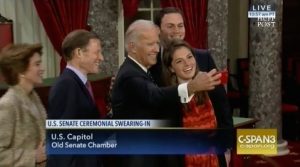In good news, House Republicans’ retreat from their sneaky effort to weaken the Office of Congressional Ethics shows that Congress will still listen to public pressure.
In bad news, Rep. Kristi Noem joined all but six of her Republican colleagues in voting for an unconstitutional restriction on House members’ right to document their work on behalf of the public. Check out this change to the House rules:
The Sergeant-at-Arms is authorized and directed to impose a fine against a Member, Delegate, or the Resident Commissioner for the use of an electronic device for still photography or for audio or visual recording or broadcasting in contravention of clause 5 of rule XVII and any applicable Speaker’s announced policy on electronic devices.
…A fine imposed pursuant to this paragraph shall be $500 for a first offense and $2,500 for any subsequent offense.
…Upon notification from the chair of the Committee on Ethics pursuant to clause 3(g)(3)(C), the Chief Administrative Officer shall deduct the amount of any fine levied under clause 3(g) from the net salary otherwise due the Member, Delegate, or the Resident Commissioner [U.S. House of Representatives, House Resolution 5, approved 2017.01.03].

No selfies from the floor? No livestreaming when the House leadership shuts down the public cameras?
Congress already has loads of rules restricting audio and video recording at the Capitol. But H. Res. 5 puts teeth in the rules for members by docking their pay.
House Judiciary Democrats, law professors, and the ACLU don’t like that rule. In an open letter to House leadership, 38 law profs contend that the new rule violates the U.S. Constitution, Article 1, Section 5 provision by delegating the House’s power to punish its members to a single administrative officer. The fine impinges on the Article 1 Section 6 immunity from civil or criminal liability “for any speech or debate in either House”—and I would contend along with most courts that taking a selfie and otherwise electronically documenting legislative activities is speech. The law profs “note that federal courts have previously held there is a First Amendment right to video record city council meetings.”
I will always stand first on the First Amendment, but the law profs footnote a back-up argument that cutting Reps’ pay for selfies might violate the Last Amendment:
An additional issue concerns the 27th Amendment which provides “No law, varying the compensation for the services of the Senators and Representatives, shall take effect, until an election of Representatives shall have intervened.” The proposed House rules amendments could be seen as having the potential effect of reducing Member pay without an intervening election, as the Chief Administrative Officer would be required to automatically deduct the amount of the fine from the Member’s pay [Jamie Raskin, Laurence H. Tribe, et al., letter to Rep. Paul Ryan and Rep. Nancy Pelosi, 2017.01.03].

Article 1, First Amendment, 27th Amendment—from beginning to end, the Constitution says Kristi Noem and her cranky Republican colleagues have no right to ban members from documenting House activities. Come on, Kristi: don’t build a wall between the people and elected representatives. Selfies are o.k. in China; they’re o.k. in the seat of democracy.
Republicans being against freedom?
70 violations would confiscate a member’s entire congressional salary for a year. Here’s what I propose: A filthy rich Democrat like Jared Polis (D-CO) should purposefully violate the rule in front of the Sergeant-At-Arms 70 times in one day and flat dare them to take his annual salary.
How about fining wingnuts-each one- ten grand per day per amendment violated for violating the constitution? All fines given to Planned Parenthood and other worthy charities of the Dems choosing.
The only cameras allowed in the House are owned by the House Recording Studio. CSPAN has no control over them and is only allowed access to the broadcast stream while the House is in session. It’s been this way since 1977. Even Pelosi rejected a request by CSPAN to allow private cameras in the House in 2007. It seems not even the Democrats wanted to change the rules when they had a chance.
The 1st Amendment and 27th Amendment arguments are weak at best. Article 1, Section 5 of the Constitution allows each house of Congress to punish its own members for violating rules as defined by each chamber, including inappropriate or bad behavior. It reads, “Each House may determine the Rules of its Proceedings, punish its Members for disorderly Behaviour, and, with the Concurrence of two thirds, expel a Member.” Fines have been levied and paid in the past without any 1st Amendment/27th Amendment constitutionality tests.
Also the Office of Congressional Ethics is in need of reform. There have been numerous complaints from both sides about a lack of due process and evidentiary standards. What better time is there to make changes to the rules governing the House for the next session then at the beginning of the new Congress? That is setting priorities regardless of what Trump is tweeting. Besides the executive branch should have no say in what rules the House and the Senate determine to implement. That’s the Separation of Powers. Shame on Speaker Ryan for once again developing clay feet.
How is the First Amendment argument weak when we have a clearly established right to record city council meetings? If every action on the House floor is a matter of public record, how can we prohibit a citizen (including one who happens to be elected) from recording that action, as long as that recording does not disrupt proceedings?
The South Dakota Legislature permits cameras in committee and galleries. Legislators tweet from the floor. What warrants fining legislators for using technology to record what happens in Congress?
Your argument about Article 1, Section 5 is weak, Don Coyote. It’s not really even an argument. You are claiming that House rules supersede constitutional provisions. Nothing that Congress passes – laws for the nation or rules for the House – may supersede the constitution.
Wearing a live streaming camera should be required for every official elected or appointed.
As they fear, once we saw how the sausage was made, we will all become third party vegetarians.
Barry, I’d love to see the stream from those cameras at the events on the Chamber of Commerce’s social calendar.
That’s right! Body cams! Hey, those that enforce the laws are required to wear them. Why not the people that MAKE those laws? Sure would give some insight!
The selfie with Aaron Schock, says it all. Schock now indicted.
This is who Kristi hangs with, of course she does not want ethics, who needs ethics? Time for Kristi to go back to the farm, party over!
@cah: “How is the First Amendment argument weak when we have a clearly established right to record city council meetings?”
1) I don’t know that there is a “clearly established right” to privately broadcast city council meetings. I’d suspect that in Sioux Falls, for example, that the broadcasts are controlled by the city and rules established by the city since they have their own dedicated cable channel. However …
2) Congress is not governed by city council rules. Art 1, Sec 5 gives a tremendous amount of power to the individual houses in Congress to govern their own affairs and members. In the 1970s when it was first decided to broadcast gavel to gavel, there was much concern and consternation over “acceptable standards of dignity, propriety, courtesy and decorum”. Many members expressed concerns over the impact television might have on the institution, it’s effect on the efficiency, traditions and reputation of Congress. The broadcasts can only be used for educational or informational purposes and not for any partisan campaign purposes. In addition broadcasts can’t be used to discredit or dishonor a Representative/Senator.
FYI, individual Congressional committees can set their own rules separate from floor rules on the broadcasting of their hearings including the use of private cameras.
A good summary and history of live broadcasting of Congress can be read here:
https://fas.org/sgp/crs/misc/R44665.pdf
@Rorschach: “You are claiming that House rules supersede constitutional provisions. Nothing that Congress passes – laws for the nation or rules for the House – may supersede the constitution.”
No, I’m claiming the Constitution gives to the House and Senate the exclusive power to establish their own rules governing their procedures and members. I don’t see that there is an inherent conflict between the First Amendment right of Freedom of the Press or Free Speech and Art1, Sec 5.
I envision letting the members of Congress use their smartphones to record/live stream Congress will result in what happens when parents are recording their snowflakes performances in school plays and concerts. Total mayhem as people stand in front of one another, blocked views and a crowd of raised hands trying to capture “history”. Save me from the vidiots on YouTube.
What Coyote really means is he knows and he knows we know, wingnuts will commit treasonable offenses behind closed doors and don’t want any documentation of their crimes. No video evidence, no foul. Brought to you by the pathological lying party of personal responsibility-unless your a wingnut.
What’s it like to still be in the 70’s? I thought it sucked. The good old days are now, furry!
In 2016, the South Dakota Legislature passed SB 90, which says, “No state, political subdivision, or public body may prevent a person from recording, through audio or video technology, a public meeting that is open to the public as long as the recording is reasonable, obvious, and not disruptive.” Even the South Dakota legislature recognizes (almost unanimously) the right to record public meetings at every level.